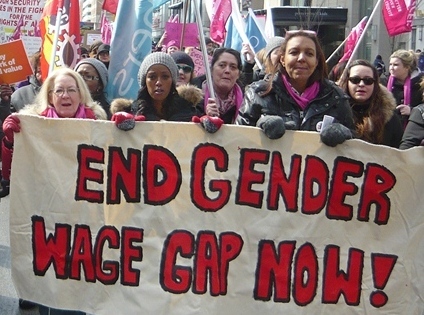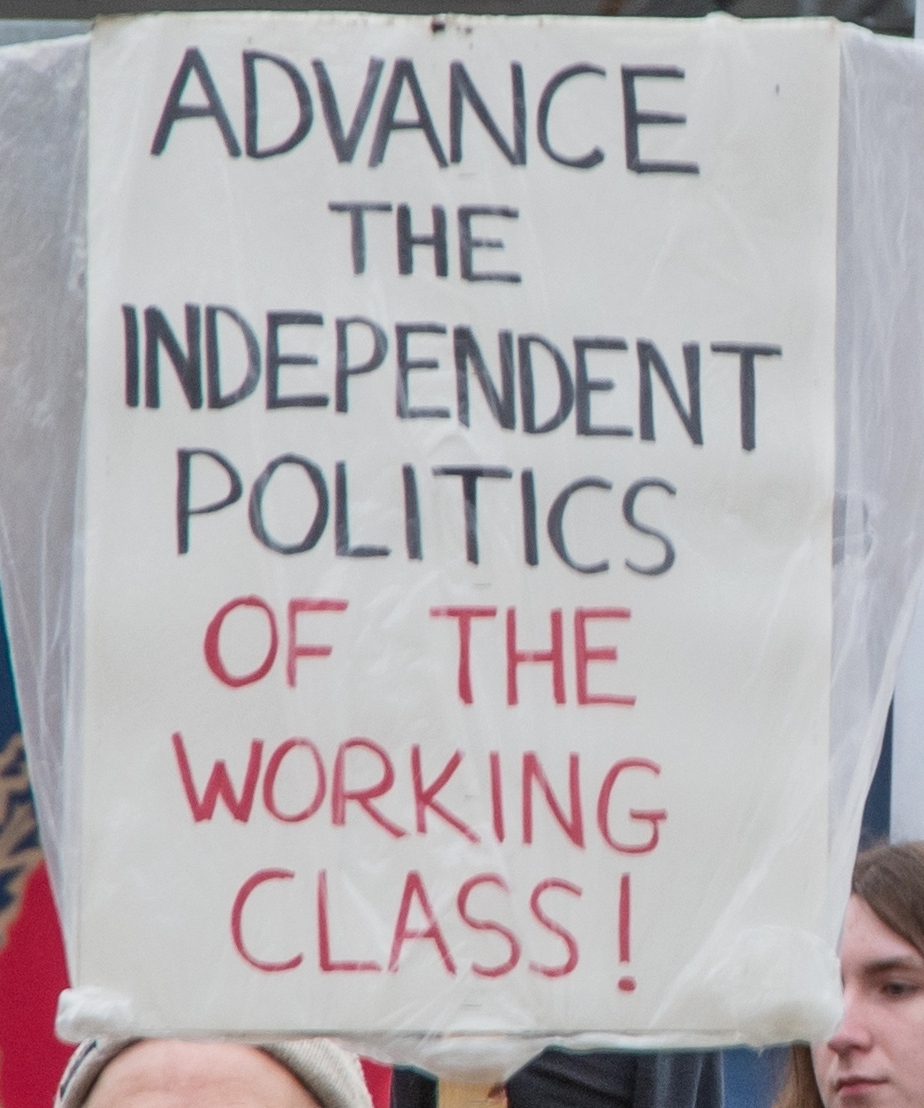September 26, 2022 - No. 18
Call for Workers and Youth to Reject the Lie that
Wage Increases Contribute to Price
Inflation
Serious Crisis Already Upon Us

• False Accusations to Blame Workers for Inflation Based on Big Lie
• The Battle for Pay Equity and Empowerment
• Decline in Investment in Fixed Means of Production
Call for Workers and Youth to Reject the Lie that
Wage Increases Contribute to Price Inflation
Serious Crisis Already Upon Us
The ruling elite and their mass media are spreading the disinformation that wage increases contribute to price inflation. Those who own and control the economy and much of the mass discourse are attempting to wreck public opinion. Their disinformation is aimed at making sure working people do not unite to defend their claims on the social wealth they produce but become defensive about their demands for wage increases. What is the truth of the matter?
This past week, the Bank of Canada raised what is called its trendsetting interest rate by three-quarters of a percentage point. The media called it a move by the central bank "in its mission to rein in runaway inflation." The bank's rate impacts the rates that consumers and businesses get from their banks on things like mortgages, lines of credit and savings accounts. The Bank of Canada's rate is now set at 3.25 per cent. That is the highest level for the bank's rate since early 2008, before the financial crisis.
 The
interventions by the central bank in the economy are the most
self-serving measures to make sure the rich come out of the
crisis
unscathed and on the contrary they make more money. To hell with
what
happens to the people and society. First the bank cut its rate
to near
zero in 2020 in the
name of stimulating the economy in the early days of the
pandemic.
Reports now declare that "Canada's central bank has moved
aggressively
to raise lending rates to try to cool red-hot inflation, which
has
risen to its highest level in decades." In other words, we are
to
believe that people must
suffer to cool "red-hot inflation."
The
interventions by the central bank in the economy are the most
self-serving measures to make sure the rich come out of the
crisis
unscathed and on the contrary they make more money. To hell with
what
happens to the people and society. First the bank cut its rate
to near
zero in 2020 in the
name of stimulating the economy in the early days of the
pandemic.
Reports now declare that "Canada's central bank has moved
aggressively
to raise lending rates to try to cool red-hot inflation, which
has
risen to its highest level in decades." In other words, we are
to
believe that people must
suffer to cool "red-hot inflation."
While Canada's inflation rate eased somewhat last month from its 30-year high of 8.1 per cent, the bank noted in its decision that most of that decline was due to gas prices, while the rest of the economy still saw "a further broadening of price pressures, particularly in services."
That persistent underlying inflationary pressure is a big reason why "the policy interest rate will need to rise further," the bank said, noting that it "remains resolute in its commitment to price stability and will continue to take action as required to achieve the two per cent inflation target."
Meanwhile, the ruling elite and their mass media are spreading the disinformation that wage increases contribute to price inflation.
Under the guise of a speech dealing with surging inflation, Bank of Canada Governor Tiff Macklem demanded employers not raise wages for their workers. Many question why a Bank of Canada Governor would openly and brazenly attack the claims of the working class when he is supposed to be dealing with inflation and other problems in the economy.
Far from being defensive or apologetic, the class struggle to defend what belongs to workers by right is crucial for the well-being not only of workers themselves but the society as a whole. By collectively defending their wages, benefits and working conditions, workers can also lead and develop the struggle for new relations among humans and with nature.
A
concrete analysis of concrete conditions reveals the specific
historical juncture at this time which calls on the workers to
set a
new course for the economy and society as a whole. The
transformations
of the process of production as a result of the scientific and
technical revolution have
escaped the grasp of the productive powers, despite the mania of
narrow
private interests to create governments of police powers to
assert
control over them. This has given rise to a new situation in
which the
constitutional order and forms from the past no longer function
while
the new forms have
yet to be brought into being by the working class and people.
The
developments attest to the fact that the human productive forces
can no
longer control their own productive powers.
What is required today is the work to transform the whole of society into another whole -- a whole of human society fit for the human species. The capitalist class has become superfluous. A society based on the defence of private property has lost its moorings because private property itself is being destroyed at an increasingly rapid rate by those who are set on destroying whatever they cannot control. One of the achievements of the transformations of the process of production as a result of the scientific and technical revolution is that it has made the very conception of private property obsolete.
The material conditions for the ruling elite to operate within the bounds of the old constitutional order no longer exist. The striving to uphold a rule of law nationally whose aim is to defend relations based on the preservation of private property within the borders of that nation and an international rule of law and institutions which defend that order internationally has become irrational at a time narrow private interests operate on a global basis and their mission is to dominate come what may or destroy what they cannot control.
This is what the disinformation of the ruling class and its retinues seek to cover up. The more the crisis will deepen, the more they will attack the working people, blame them for their own failure to control the productive powers and continue with their projects to pay the rich in the name of high ideals.
Workers organizing on the basis of their own independent politics, set by working out their own vantage points within each situation, can turn things around in their favour. In fact, it is up to the working class to rally the people to humanize the social and natural environment in a manner which favours them. In the face of the assaults against them during the current serious economic crisis, the situation calls on them to defend their claims on the new value they produce.
It is a necessary feature of preparing the people in their entirety to change the economic, political and social conditions to bring them into conformity with the need of socialized forces of production to bring their productive powers under the control of the people. The disinformation that higher wages and benefits for workers create price inflation is meant to disorganize the working class and block it from defending its claims and rights, and from engaging in "the work to transform the whole of society" on par with the call of history.
False Accusations to Blame Workers for Inflation Based on Big Lie
 Opposed
to bringing into being a society based on human relations between
humans and humans and humans and nature are the narrow private
interests which own and control the main sectors of the economy and
private enterprises, and the constitutional order which puts everything
at their disposal. These reactionary forces expropriate for their own
private interests a portion of the new value workers produce, including
in the public sector. The portion of the new value they expropriate,
which generally exists as profit and taxes, is in contradiction with
the amount the workers claim individually as their own and collectively
as social programs. To accuse workers of causing a rise in the market
price of social product by their claims on the new value they produce
is false. Changes up or down in workers' claims on the new value they
produce change the ratio in which new value is divided but not its
total.
Opposed
to bringing into being a society based on human relations between
humans and humans and humans and nature are the narrow private
interests which own and control the main sectors of the economy and
private enterprises, and the constitutional order which puts everything
at their disposal. These reactionary forces expropriate for their own
private interests a portion of the new value workers produce, including
in the public sector. The portion of the new value they expropriate,
which generally exists as profit and taxes, is in contradiction with
the amount the workers claim individually as their own and collectively
as social programs. To accuse workers of causing a rise in the market
price of social product by their claims on the new value they produce
is false. Changes up or down in workers' claims on the new value they
produce change the ratio in which new value is divided but not its
total.
The ratio between the portion of new value those in ownership and control expropriate and the amount workers claim may change but this in itself does not change the amount of new value workers produce, its price of production or the market price at which the social product is sold.
The amount of new value workers produce is determined by the average work-time necessary to produce a given quality and quantity of social product. Productivity decreases the average work-time necessary to produce a given quality and quantity of social product. This lowers the amount of new value within the given quantity of social product but does not change the ratio between the expropriated value and the claims of workers within the new value. Productivity lowers both the expropriated value and the claims of workers on a given quality and quantity of social product because the amount of new value decreases within the whole.
 To
change the ratio between expropriated value and claims of the
workers
does not change the total. Productivity changes the total new
value
within the social product and its price of production. Changing
the
ratio between expropriated value and workers' claims does not
change
the amount of new
value, the price of production of the social product or its
market
price. Other factors are involved in that.
To
change the ratio between expropriated value and claims of the
workers
does not change the total. Productivity changes the total new
value
within the social product and its price of production. Changing
the
ratio between expropriated value and workers' claims does not
change
the amount of new
value, the price of production of the social product or its
market
price. Other factors are involved in that.
The new value combined with the transferred-value from the material means of production used up in production, the necessary work-time to produce the social product, determine the price of production, which forms the base for its market value and price. Productivity changes the ratio between the old and new value as less new value is needed and more old value is required to produce a given quality and quantity of social product. Productivity generally lowers the amount of necessary new value faster than it increases the amount of necessary old value, which results in less work-time necessary to produce a given quality and quantity of social product generating a lower price of production. The ratio between new and old value and the amounts necessary to produce the same amount of social product are the main factors that change the price of production.
Factors beyond necessary work-time and the price of production such as supply and demand of a given social product, war, tariffs, sanctions, competition among private interests, monopoly control over market prices, and the amount of currency in circulation play large roles in the market price of social product but they do not change the price of production.
Changes in the market price of social product fall under the purview of those in ownership and control of the productive forces, which does not include the working class and its claims on the new value workers produce. Control over the productive forces has become an issue facing the whole of society as this control has slipped out of the grasp of even those who own the productive forces as private property, creating global conditions of anarchy and violence.
The working class is charged by the social conditions of wage slavery to defend its claims on the value it produces. Without doing so, workers would not only acquiesce to a lowering of their living conditions within the economy and society but, as a consequence, contribute to dragging down the society as a whole and forestalling the necessary changes that must be made in relations among humans and with nature, if the society as a whole is to survive.
The Battle for Pay Equity and Empowerment
The United Nations General Assembly created the International Equal Pay Day in 2019 to be marked annually on September 18. The UN says the action "further builds on the United Nations' commitment to human rights and against all forms of discrimination, including discrimination against women and girls."

Discrimination against women is made worse with the refusal of the ruling elite to increase funding for social programs. The lack of investment to improve and extend social services to all areas of life hurts women in particular. It denies women and girls educational opportunities and time away from traditional household duties to engage in socialized employment and other activities outside the home.
Also, socializing household chores such as cooking, cleaning and early child care would allow women to diversify and improve their capacity to work and its value, to unite and participate with fellow workers in the struggle for higher wages and better benefits and working conditions, and to engage in politics and other social affairs in the battle for a modern cultured life, empowerment, democratic renewal and a new pro-social direction for the economy.
Decline in Investment in Fixed Means of Production
Statistics Canada (StatCan) reported price inflation rose 7.7 per cent from May 2021 to May 2022. In general terms this means more money than necessary was chasing the available goods and services.
Using low interest rates as incentive, the big banks and other financial institutions poured massive amounts of new money into circulation through loans. In addition, the ruling elite in political control handed over enormous amounts of public funds to private interests in pay-the-rich schemes and pushed the economy over a cliff of wasteful production for war and war preparations, including expansion of commitments to NORAD and U.S. global war plans for NATO.
The injection of new money into the economy was not weighted towards expanding or refurbishing means of production. Investment in fixed means of production has been declining since 2015 with the total stock of fixed productive forces per worker falling to the point of not keeping up with depreciation or population growth. In general this affects the available stock of fixed means of production such as non-residential buildings, engineering structures, machinery, equipment and software, the tools workers need to produce.
StatCan detailed the decline of fixed means of production since 2015 as: engineering construction down three per cent; other machinery and equipment down 17 per cent; non-residential building down one per cent; and, surprisingly, software and other intellectual goods down 12 per cent.
Taken together the fall in the stock of fixed productive forces in all categories has registered a general decline of five per cent since 2015. Statistics Canada's June report also noted productivity in the economy fell 0.5 per cent in the first quarter of this year -- its seventh consecutive quarterly decline. All this reflects destruction of Canada's material productive forces not just relatively but in absolute terms, leading commentators in the Financial Post to call it "downright alarming." They made the point that the only historical period where the stock of productive forces per worker declined over several years would be during the economic crisis (depression) of the 1930s.
Downsizing of the productive forces directly affects the production of goods and services and also can negatively impact the rate of development of productivity per worker. Both these phenomena would put pressure on prices to rise or at least not go down. They have now in fact risen. Also, U.S.-led global sanctions and tariffs against designated countries such as the broad ones on Russia and specific ones, for example restricting the operations of Chinese tech company Huawei, reduce the supply of goods for sale thus putting upward pressure on prices in the affected sectors and with certain goods such as energy spreading the price inflation generally.
Productivity lessens the work-time necessary to produce a good or service. In a commodity-based economy where production is destined for sale in a market, the money value of goods and services is broadly determined by the necessary work-time required to produce the commodity. Productivity and increased supply of goods and services without adjusting the money-supply in accordance with these factors causes deflation, which means a dollar could buy a greater amount of goods and services. Price deflation drives the private interests in control of the economy crazy, as deflation both lowers their money return on the goods and services they sell and the money value of the means of production and other property they have bought and own.

A combination of all these factors including the neo-liberal assault on the benefits and purchasing power of working people over the last three decades, and now with the U.S./NATO proxy war and sanctions against Russia, the dam has burst so to speak in prices. The economy cannot produce enough goods and services to keep up with the amount of currency (money) in circulation. The inflation-inducing activity is compounded with the massive slice of the economy directed towards war materiel and the stationing of troops and equipment abroad and the financing of actual wars in Afghanistan, Iraq, Libya, Syria etc. and now the U.S./NATO proxy war against Russia and the pouring of war materiel into Ukraine and Europe, all the while antagonizing and preparing for war against China.
The Financial Post writes without specifying what the spending is on or who is doing it: "Prices are rising fast because spending is rising fast while production is not. The capacity of our economy to produce is flatlining because business investment has been so weak that the stock of productive capital [sic] (should read material productive forces – TML ed. Note) per worker is falling. If we do not turn that around, the outlook for real growth in living standards in the coming months, years and decades is bleak."
 For
the people, knowing the problems and even the solutions does not
result
in action because of their absence of political power. The
anachronistic
colonial political forms do not allow the people to put their
understanding and desires for solutions into practice. So how do
we
lift the bleakness
of this economic and political fraud when the same self-centred
private
interests of the ruling elite who are responsible for the crisis
still
hold economic, political and social control?
For
the people, knowing the problems and even the solutions does not
result
in action because of their absence of political power. The
anachronistic
colonial political forms do not allow the people to put their
understanding and desires for solutions into practice. So how do
we
lift the bleakness
of this economic and political fraud when the same self-centred
private
interests of the ruling elite who are responsible for the crisis
still
hold economic, political and social control?
The people can only apply solutions to these problems in conjunction with their striving for political power. As they build new political organizations, new economic and social forms and relations among people and with nature on the basis of new thinking, institutions and ways of doing things, they serve the collective good and well-being. It gives the people the political power to solve real problems on the basis of real solutions. The ruling elite will not suddenly stop waging endless wars, destroying and bleeding the economy dry for maximum profit, and manipulating politics to serve their narrow private interests. They are caught within an imperialist system where they grow richer and more destructive while the people become poorer. The ruling elite have no motivation to change their ways or even contemplate changing. The time is now for the people to strike out boldly to build the new on their own terms!
(To access articles individually click on the black headline.)
Website: www.cpcml.ca Email: editor@cpcml.ca


